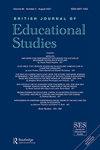受过高等教育的人应该得到更多的选票吗?教育、投票和代表权
IF 2.1
3区 教育学
Q2 EDUCATION & EDUCATIONAL RESEARCH
引用次数: 0
摘要
本文探讨了教育、投票和代表权之间的关系,特别是关于受过高等教育的人应该拥有更多选票的论点,因为他们应该更好地判断重要的政治决策。在过去,这个问题引起了柏拉图、亚里士多德、纽曼和穆勒等大思想家的注意。在英国也有一个实际的先例,几个世纪以来,大学毕业生在议会中都有自己的代表,这在今天很少被人提起。在这个话题上,也有一些有趣的当代争论,这些争论是由社会科学家提出的,支持一种贵族统治(有些人称之为贵族统治),而不是教育工作者。似乎大多数教育工作者现在都不敢建议受教育程度越高的人应该获得更多的投票权,这主要是出于公平的考虑。本文章由计算机程序翻译,如有差异,请以英文原文为准。
SHOULD THE MORE HIGHLY EDUCATED GET MORE VOTES? EDUCATION, VOTING AND REPRESENTATION
This article examines the relation between education, voting and representation, and, in particular, the argument that more highly educated people should have more votes, as they should be better at judging important political decisions. In the past this issue attracted the attention of great thinkers such as Plato, Aristotle, Newman and Mill. In the UK there is also a practical precedent, rarely recalled today, where for centuries university graduates had their own representatives in Parliament. There are also some interesting contemporary arguments on the topic put forward in favour of an epistocracy (as some call it) by social scientists, but not educators. It seems that most educators would not now dare to suggest that the more highly educated might be given more votes, largely on the grounds of equity.
求助全文
通过发布文献求助,成功后即可免费获取论文全文。
去求助
来源期刊

British Journal of Educational Studies
EDUCATION & EDUCATIONAL RESEARCH-
CiteScore
4.50
自引率
5.30%
发文量
36
期刊介绍:
The British Journal of Educational Studies is one of the UK foremost international education journals. It publishes scholarly, research-based articles on education which draw particularly upon historical, philosophical and sociological analysis and sources.
 求助内容:
求助内容: 应助结果提醒方式:
应助结果提醒方式:


